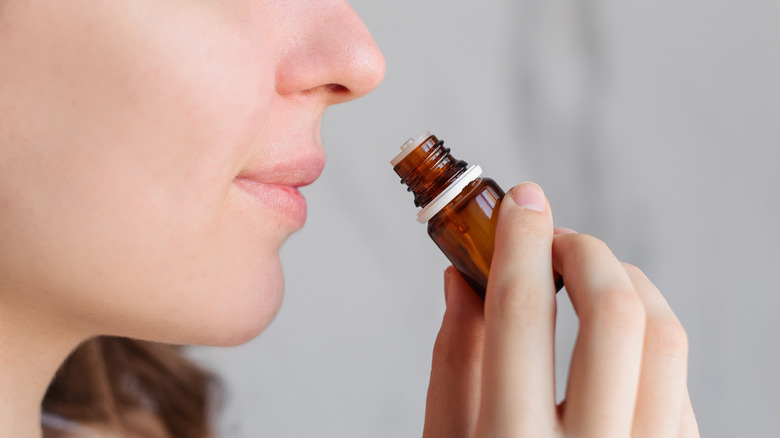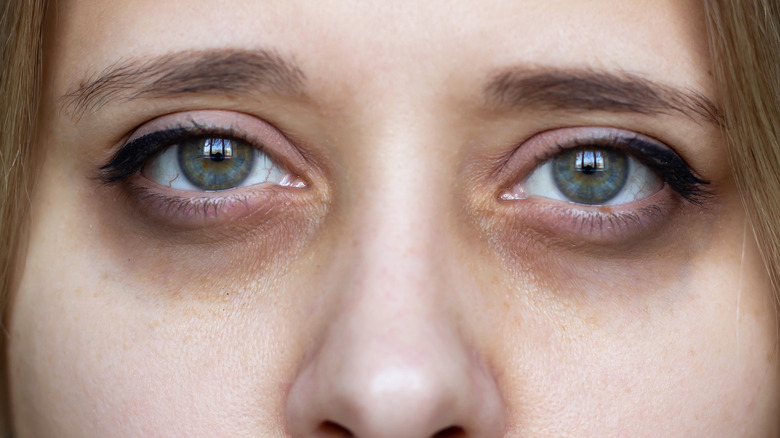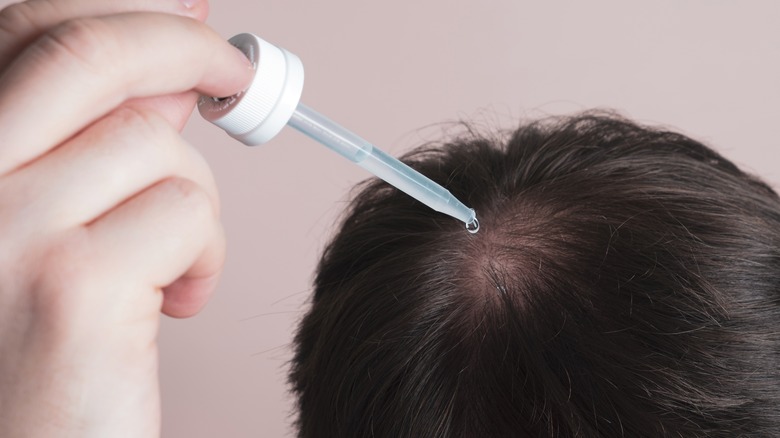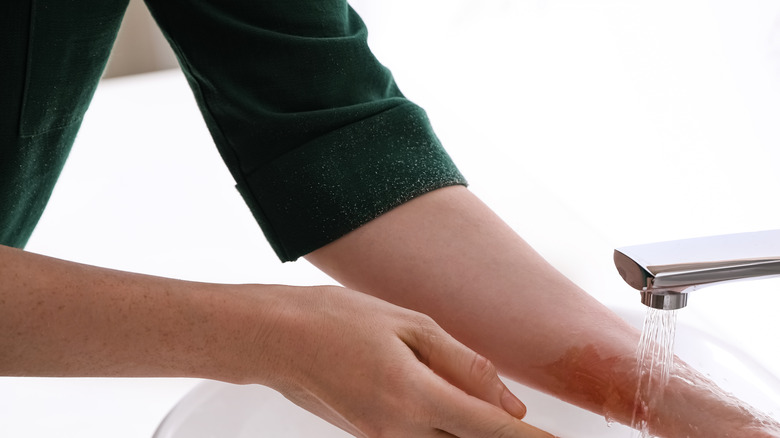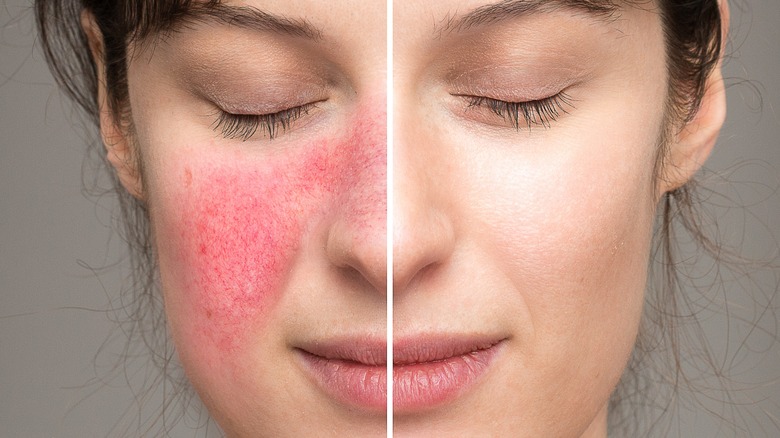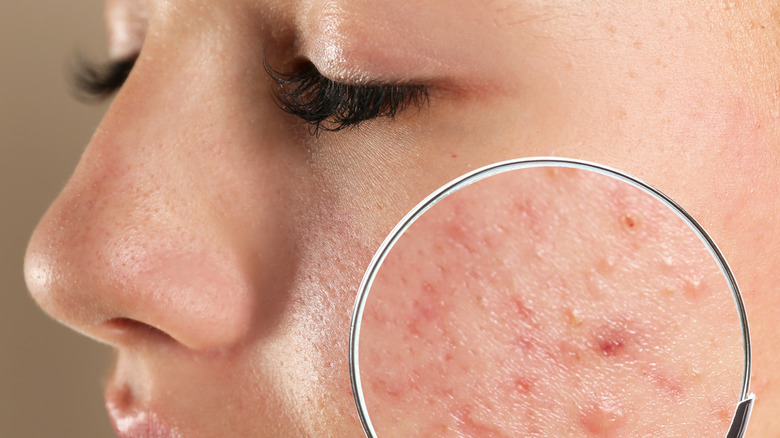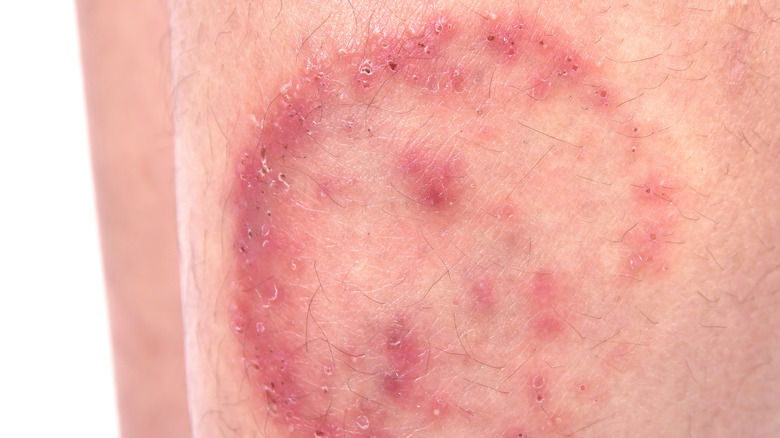14 Conditions That Essential Oils Can Help Manage
It's somewhat safe to say that essential oils have surged in popularity. Essential oils are an excellent addition to your wellness toolkit, and science is backing up many claims made by the alternative medicine community touting their benefits. Dr. Yufang Lin, integrative medicine specialist, spoke to the Cleveland Clinic and affirms, "Essential oils are fantastic. They have many benefits."
So what are they exactly?
Dr. Lin explains that essential oils are basically a highly concentrated extract of a particular plant. You may not have known this, but it can actually take a lot of a plant to get a small amount of essential oil. For example, it takes upwards of 250 pounds of lavender flowers to extract just one pound of lavender essential oil (per the Cleveland Clinic). As for roses, it takes more than 5,000 pounds of rose petals to extract one pound of rose essential oil. Despite this fact, essential oils are more abundant and widely available than seemingly ever before. Their benefits are multifold, and experts at the clinic explain that they can be used topically and inhaled (as a form of aromatherapy) to receive their medicinal properties.
If you are curious about how you can incorporate essential oils into you or your loved ones' daily lives to treat certain conditions, continue reading.
Anxiety
Without knowing it, you may have already used essential oils to help calm you down. If you've ever purchased a lotion, air freshener, or candle that had the words "calming," or "soothing," on the label and featured, say, lavender essential oil — then you are already familiar with this particular use. Experts at Healthline explain that when you inhale the scent of an essential oil its aroma goes to your brain, activating your nervous system, and potentially creating an effect on both a chemical and energetic level. Before embarking on your essential oil journey, it's important to note that currently, the FDA does not regulate essential oils, so be sure to buy them from a highly researched and trusted source that has certifications.
With that said, Healthline experts say that there is an abundance of oils that can help treat anxiety, and lavender made their list. Touting it as one of the top oils used in aromatherapy, the site explains that its "sweet, floral scent" can help calm you down, and can even be used for its sedative effects at night. Vetiver is another essential oil the site recommends. While it may not be as popular as lavender, several studies (on animals) have shown that it has anti-anxiety effects that are akin to some commercial drugs.
Depression
If you've struggled with depression, you're probably aware that there are many treatments available, and you may have tried several. While there may be no perfect solution, there are certain combinations and add-ons to treatments that may be effective. According to Medical News Today, research is proving that using essential oils can be used to treat symptoms of depression effectively. A review published by the International Journal of Molecular Science found that certain essential oils have been found to increase both serotonin and dopamine levels, helping to relieve both depression and symptoms arising from depression.
One particular study the review mentions found that inhaling both lavender and chamomile helped to "decrease levels of depression, anxiety, and stress in older adults," by potentially calming down the sympathetic nervous system. Some of the essential oils the review recommends for depression include rosemary, bergamot, and sweet orange to name a few.
Another way that essential oils may help with depression is by increasing the expression of what is called brain-derived neurotrophic factor (BDNF). According to one study published by Neuropsychiatric Disease and Treatment, those who report having depression show lower levels of BDNF.
Fatigue
If you need a pick me up and want to avoid reaching for a third cup of coffee, why not reach for an essential oil instead? While you've learned that some oils are good for calming you down, there are also many oils that have been scientifically proven to boost your energy levels too. According to Healthline, there are five essential oils that have been officially backed by science to help reduce fatigue and improve your focus: peppermint, sweet orange, spearmint, rosemary, and lemon. Starting with peppermint, a study published by the Journal of the International Society of Sports Nutrition found that athletes who drank mineral water that had drops of peppermint essential oil over a period of 10 days experienced increased exercise performance.
Another study published by Scientia Pharmeceutica found that after inhaling rosemary, participants found themselves to be more active, and reported feeling "fresher" than before. Other essential oils that are associated with boosting energy but that require more research include bergamot, cinnamon, lime, basil, ginger root, and French basil. To get the best out of the essential oils, experts at Healthline say that you can inhale their aroma directly from the bottle, by using a diffuser, or by diluting the essential oil in a carrier oil such as jojoba oil, and applying it to your skin.
Cough
Essential oils are not only good for mood and energy levels, but can also help treat physical ailments as well. Experts at Medical News Today explain that while the cause of your cough could range anywhere from the common cold, to a respiratory infection, essential oils can help ease your symptoms regardless of their origin. For starters, the site mentions eucalyptus oil as one of the top essential oils for cough, stating that it is often one of the primary ingredients in vapor rubs used on the chest to calm coughs. One of the ways eucalyptus essential oil can help fight off a cold and heal your cough is via its antimicrobial properties, meaning it can kill bacteria that can lead to illness. Eucalyptus oil is also known for its inflammation reducing and pain reducing properties, which can be soothing if you are in pain from excessive coughing.
Oregano essential oil is another great oil for cough, according to experts at Medical News Today due to its "high level of a potent compound called carvacrol," which acts as an antimicrobial in the same way eucalyptus does. Bergamot, on the other hand, contains an ingredient called camphene, which when inhaled, has both a cooling and refreshing effect according to the site, which can be soothing to those dealing with a persistent cough.
Dandruff
If you've ever dealt with dandruff you already know how annoying and frustrating it can be. On top of being hard to get rid of, it can also be downright embarrassing. If your shampoos aren't working and want a more natural solution, essential oils may be a better bet. Before recommending which essential oils work best for dandruff, experts at Well + Good bust the myth that it is caused by dry skin, explaining that it's actually a result of excessive amounts of oil on the scalp. The flakes that you see on your scalp are actually the result of the yeast, malassezia that "feeds off of the oil produced," by your scalp, resulting in "yellow-ish flakes." Delightful.
There is such a thing as dry scalp, however, which is when your skin flakes off due to dry skin from shampoo, stress, weather, etc. The two, however, are not the same.
For starters, to treat dandruff, you should always mix the oil with a carrier oil — on their own, essential oils can be too harsh. A great first oil to try is tea tree oil, according to Mariza Snyder, functional practitioner and author of The Essential Oils Hormone Solution. "It is a powerful antibacterial and antifungal that both nixes and wards off any foreign invaders attacking your scalp," she explains to Well + Good.
Hair loss
Dealing with hair loss is no walk in the park. If you are experiencing hair loss from stress, illness, or other reasons, using essential oils may be an effective treatment to help stop the loss and regenerate new growth, according to experts at Healthline. Starting with lavender essential oil, experts at the site say that the oil can help "speed up hair growth." One study (conducted on mice) and published by Toxilogical Research found that applying the oil to mice fur resulted in an "increased number of hair follicles, deepened hair follicle depth, and thickened dermal layer." Furthermore, due to lavenders antifungal and antimicrobial effects, it may help treat scalp issues that may potentially lead to hair loss.
Another great oil to use to promote hair growth is peppermint. Healthline experts explain that peppermint increases circulation to the scalp when applied, which supports hair growth. Rosemary is another top choice for stimulating growth due to the fact that it can "improve cellular generation." Healthline explains that one study showed rosemary oil worked just as well as a popular hair growth medication, but with fewer negative side effects. Again, be sure to mix these oils with a carrier oil before applying them to the scalp.
Burns
If you've ever burned yourself, you know that the healing process can be somewhat long and painful. However, using essential oils to help soothe, heal, and repair your skin is becoming a popular way to treat minor, first degree burns. Healthline experts name several oils that are good for this purpose, starting with chamomile. Chamomile essential oil is good for burn relief due to its "emollient, moisturizing, and skin-rejuvenating properties," according to the site. It's use for this purpose isn't new, as this flower has been used throughout time to help repair skin.
Oregano is another essential oil that can help heal burns. A study published in The Journal of Ethnopharmacology found that the oil worked well at healing burns and wounds at a rapid pace. Pine essential oil can help heal burns by helping to lower inflammation, eliminating pathogens, and ultimately reduce scarring. Sage, St. John's Wort, tea tree, thyme, peppermint, juniper, and lavender, were also mentioned by the site as essential oils that could help relieve burns.
Bug bites
If you've found yourself with a bunch of bug bites and are wondering, "What now?" essential oils may be the answer you're looking for. Medical News Today experts explain that not only can essential oils soothe an annoying itch, but they can also help prevent infection from open bug bites. This is because their anti-inflammatory properties can help reduce itch, while their antimicrobial properties can prevent bacteria from entering a bug bite that may be open from having scratched too much.
To help soothe irritated skin, peppermint and menthol oils are recommended for their cooling properties, which can calm down burning, itching, and stinging. However, experts recommend not applying peppermint to bug bites that are open, as it might cause further aggravation. Medical News Today also recommends Camphor oil to apply to itchy bug bites, as it creates "pleasant warming sensations" on the skin which may feel good in comparison to an itchy feeling. Chamomile makes another appearance here for its calming and soothing properties, which may help keep itching at bay. Experts explain that chamomile has anti-inflammatory properties, which can also help in the case of an allergic reaction.
To treat bug bites, dilute a few drops of the essential oil in a carrier oil, and gently massage it into the skin.
Rosacea
Rosacea is a condition that affects the skin, and is characterized by reddish coloration on the nose and the cheeks, according to Healthline. While redness on the nose and cheeks is most common, it can also spread to the "forehead, back, chest, ears, and even eyelids," in some cases. Furthermore, it occurs most commonly in people with pale skin. Fortunately, rosacea is not a serious condition, and can be treated with over the counter medication as well as with essential oils. Healthline experts explain that chamomile may be a good option for those looking for a natural solution, as it is often used in treatments to help those with skin inflammation.
A review published by Molecular Medical Reports explains that chamomile possesses anti-inflammatory properties, and says that it is "one of the oldest, most widely used and well documented medicinal plants in the world." Another essential oil Healthline recommends for rosacea is lavender. Dr. Debra Jaliman, board-certified dermatologist in New York City, spoke to DermStore and explains why. "Lavender is particularly good for people with redness due to rosacea and it helps brighten the skin." She went on to say that it has "exceptional anti-inflammatory and antiseptic properties" and "soothes and nourishes the skin."
Acne
Acne is another one of those skin conditions that you may have struggled to find a solution for. Even if your skin is generally clear, it's a good idea to have something on hand to treat that occasional breakout that occurs (for some people) before every important event. Experts at Derm Collective explain that essential oils used to treat acne typically possess antibacterial and anti-inflammatory properties to help eliminate acne-causing bacteria and reduce the inflammation associated with breakouts and help in the healing process. In particular, they explain that tea tree oil is a good essential oil to use on acne-prone skin.
One study published by The Australasian Journal of Dermatology found that people who applied both a tea tree oil gel and face wash to their skin twice daily for 12 weeks saw significant improvement in "mild to moderate acne."
Experts at Derm Collective also recommend using clary sage, as it is known to help prevent breakouts due to its antimicrobial effects, and that it can also help balance the skin's oil production. Oregano oil is another option to fight off acne, as it contains the antioxidant carvacrol, which can help fight inflammation, as well as a compound called thymol which is "a bactericidal chemical that helps prevent infection."
Inflammation
Before understanding how essential oils can help with inflammation, it may help understand what inflammation is in general. Healthline explains that inflammation is caused by the body's immune system being triggered by an infection, illness, etc. It's essentially the body's way of fighting off whatever is causing the problem, but the results often feel less than helpful. A study published in the Journal of Lipid Research found that carvacrol can help suppress the expression of Cyclooxygenase-2 (COX-2), which according to the study, "plays a key role in inflammation."
As mentioned, carvacrol is found in oregano essential oil. However, the study also confirmed that clove, rose, eucalyptus, fennel, and bergamot essential oils can be used for anti-inflammatory purposes. In fact, the study found that the previously mentioned essential oils lowered the expression of COX-2 by 25%, and that thyme essential oil lowered it by approximately 65%.
In the case of inflammation, Healthline experts say you can use essential oils in a number of ways. One way to use them is via a diffuser, which diffuses water particles through the air with the aroma of the essential oils, allowing you to inhale them. You can also dilute them with a carrier oil and gently massage them onto the affected area to help reduce inflammation.
Headaches
Headaches can be brought on by a number of different things: poor posture, skipped meals, stress, lack of sleep, or even certain foods (via the Mayo Clinic). You've probably experienced them at least once, and chances are you've reached for some sort of painkiller to help ease the discomfort. If pills aren't really your style, science has proven that inhaling certain essential oils can be an effective alternative. Experts at Medical News Today share their top five suggestions for headache reducing essential oils, starting off with lavender. The site explains that many people use it as a form of stress reduction, which means that it can help reduce tension headaches or migraines that are caused by stress.
A study published in European Neuropsychopharmacology observed 47 patients that were split into two groups: one that was given lavender essential oil, and another that was given a control. The group that was given the lavender reported more of a reduction in migraine pain compared to the placebo group.
Another essential oil experts say can help with headache pain is peppermint oil. Research has shown that applying it (diluted) to the temple and forehead area can help reduce tension headaches.
Ringworm
You may remember ringworm from your childhood days as the one thing you never wanted to "catch." Despite its name, there is no worm involved in ringworm at all — it's actually a fungal infection, according to experts at Healthline. The fungal infection impacts the skin, manifesting as a ring shaped lesion (hence the name), characterized by discoloration and scaly patches of skin. It can be spread via direct contact from human to human, animal to human, object to human, and soil to human. The good news is that there are many essential oils that can help treat ringworm due to their antifungal properties.
Another Healthline article points out that essential oils made from herbs and spices tend to be the most powerfully effective antimicrobial essential oils available. Examples of these include thyme, cinnamon, oregano, citronella, geranium, lemongrass, eucalyptus, tea tree, and peppermint. Because these oils have "antiseptic, anti-inflammatory, astringent, and fungicidal properties," they can work wonders at healing fungal infections. The site recommends preparing a mixture of three of these essential oils combined, and applying it to something that is both "clean and disposable" (a sterile cotton ball or pad, for example) to the affected area, taking care not to spread it to clean areas of the skin.
Arthritis
Joint pain from arthritis can feel debilitating and immobilizing, and finding the right treatment may feel like a hassle. Research has proven, however, that taking a natural route with essential oils can help to ease symptoms. On the list of oils that can help with joint pain, experts at WebMD list bergamot, black cumin, cinnamon, eucalyptus, frankincense, myrrh, geranium, ginger, lavender, lemongrass, orange, rosemary, and peppermint in their roster of healing oils.
Regarding black cumin, the site explains that one study on older adults found that when they rubbed the oil into their knees, they saw more improvement in their pain than those who only took acetaminophen. Another study done on rats tested a combination of frankincense and myrrh essential oils. The study found that when combined, the two oils reduced joint inflammation in rats that had arthritis. Additionally, a study that tested the use of ginger oil on people with knee pain found that participants who received a massage with the oil fared better regarding pain reduction than those who received the massage by itself.
